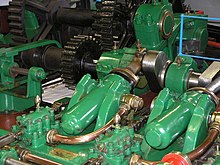Oscillating cylinder
Oscillating cylinder is a design principle for steam engines . They were used both stationary and mobile on ships. Today this construction principle is mainly used in model making. In addition to stationary model steam engines, there are also model locomotives and model ships with oscillating cylinders.
Compressed air can also be used instead of steam. With model steam engines, this allows a test without heating the boiler. In addition to single-acting machines, there are also double-acting machines.
history
Murdoch built a model of a steam engine with an oscillating cylinder as early as 1785.
Aaron Manby built the Manby (ship) in 1821 . The associated patent is "British Patent No 4558 of 1821".
Joseph Maudslay (1801–1861, the third son of Henry Maudslay ) built and patented a steam engine with an oscillating cylinder in 1827. Other significant contributions were made by John Penn (for the company of the same name ).
Single acting machine
In a single-acting machine, the cylinder is open on one side. The piston is acted upon with steam in only one of the two directions of movement.
The cylinder is pressed against the "mirror" with a spring. The spring also functions to a certain extent as a safety valve, in the event of excessive steam pressure the cylinder is pushed off by the mirror.
The crankshaft is usually provided with a mass balance.
Double acting machine
In a double-acting machine, the cylinder is closed on both sides. Steam is applied to the piston in both directions of movement. The steam consumption and the output double.
Hydraulic motors
Early hydraulic motors also used the principle of the oscillating cylinder.
Advantages and disadvantages
The cylinder is small, light, simple. It does not need any valves, but only runs in one direction (without additional valves). It has only a few moving parts, but it cannot start up itself.
other names
Web links
Individual evidence
- ↑ a b c d e Breaking a lance for oscillating steam engines ...... ( Memento from December 26, 2014 in the web archive archive.today )
- ↑ a b c d e Udo Mannek (ed.): Oscillating steam engines - history, original machines, finished models, kits, building proposals (= steam . Volume 16 ). 2, revised edition. Neckar-Verlag, 1989, ISBN 978-3-7883-1605-1 ( reading sample [PDF]). Reading sample ( memento of the original from April 12, 2016 in the Internet Archive ) Info: The archive link was inserted automatically and has not yet been checked. Please check the original and archive link according to the instructions and then remove this notice.
- ^ Murdoch's inventions ( Memento of March 19, 2010 in the Internet Archive ), Science Museum London
- ↑ Aaron Manby at Grace's Guide to British Industrial History (English)
- ↑ a b Original Maudslay oscillating marine paddle engine ( Memento from December 26, 2014 in the web archive archive.today ), Science Museum London
- ↑ a b Joseph Maudslay at Grace's Guide to British Industrial History (English)





